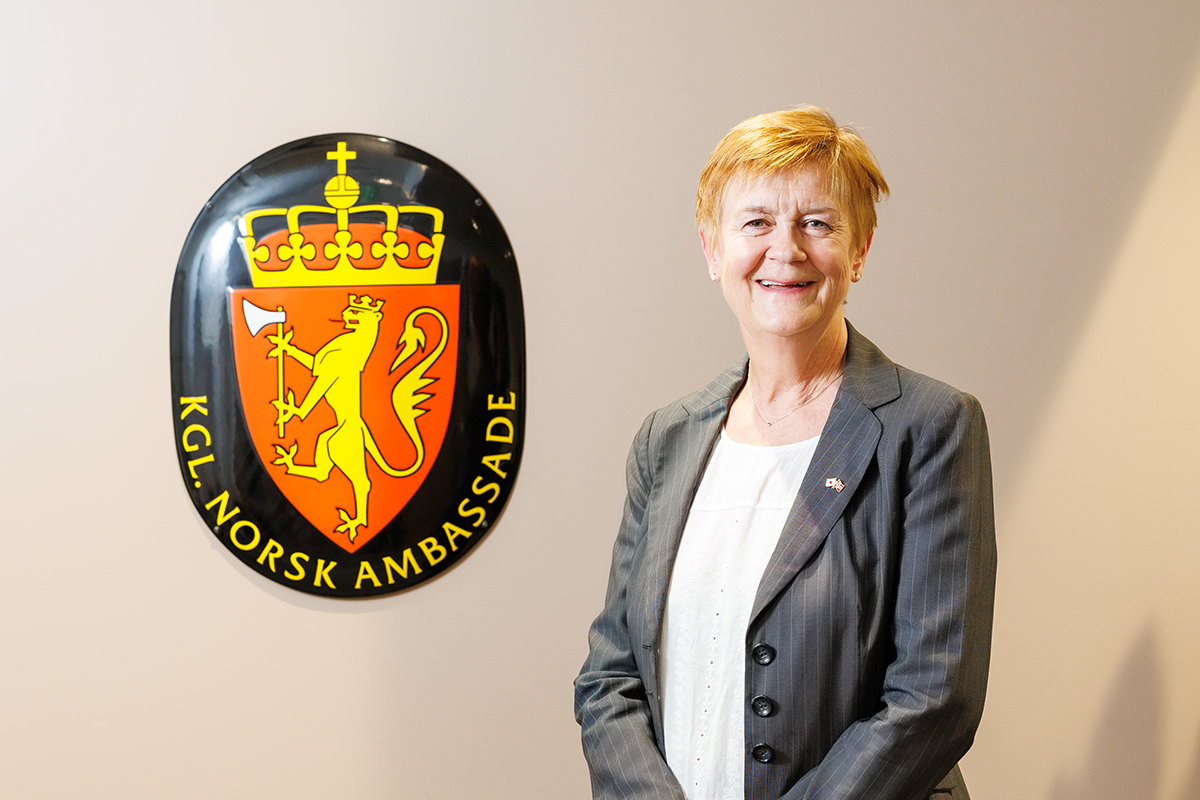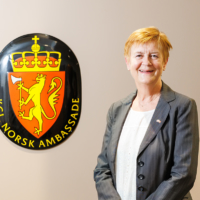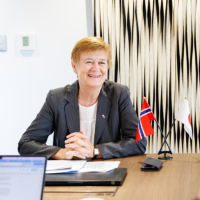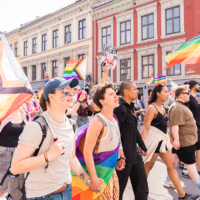Norway is internationally regarded as a leader in gender equality and inclusivity, with progressive policies and a commitment to helping citizens balance work and family life. Kristin Iglum, the Norwegian ambassador to Japan, shared her insights on Norway’s success in these areas and how diversity, equity and inclusion (DEI) have come to be embedded in the fabric of daily life.
Arriving in September last year to take up her role, Iglum was delighted to accept the posting to Japan. Having previously spent eight years representing her country in China, she already felt an affinity for East Asia and was keen to return. “I have a deep interest in what’s happening in this region, so when I had the chance to work in Japan, I thought it would be wonderful!” she said with a smile.
“I joined the foreign service in 1991. I’ve always loved having the opportunity to get to know a new country. An important part of the job is to try and learn about all aspects of the country — not only the politics and business, but also the culture,” she explained.
Iglum pointed out that Norwegians generally hold Japan in high regard and are very interested in the culture, with many people loving Japanese anime, manga and food. Norway and Japan also both have cultures rooted in fishing and maritime traditions. She feels a special connection to Japan through her love of reading, as she particularly enjoys the works of Haruki Murakami.
She has been enjoying the opportunity to travel to various parts of Japan, with the “art island” of Naoshima in Kagawa Prefecture standing out for both its renovation of traditional buildings and its modern art and architecture. She was also deeply moved after attending a memorial service in Fukushima Prefecture marking the 2011 Tohoku earthquake and tsunami.
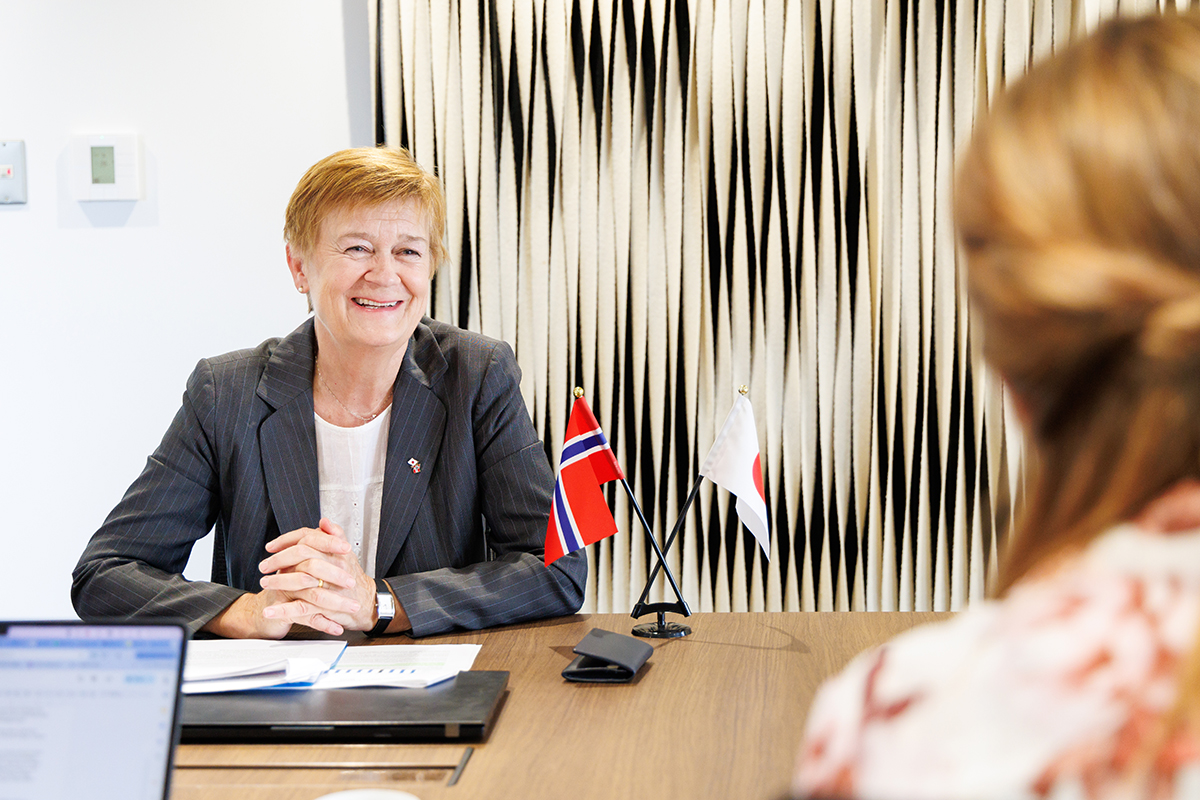
Norway takes the lead in DEI
At the core of Norway’s DEI philosophy is giving people equal opportunities from the outset, and the Norwegian foreign service celebrates diversity. As Iglum explained, “Norwegian diplomats are encouraged to promote this in work environments across all embassies worldwide. And now that I am the ambassador, it is my responsibility to make sure that there is absolutely no discrimination among all the colleagues here.”
“For me, I feel fortunate to have always worked in supportive environments. However, of course, it could have been a different experience if I had been working as a foreign expat in the local business environment,” she added.
Iglum says that balancing work and family is not only encouraged in Norway but is also a norm embraced by both men and women. “When you have a large number of women participating in the workforce and most people would like to have a family, then you really need both partners to step up and do their share, because otherwise it just won’t add up,” she said.
Norway ranked second on the 2024 Global Gender Gap list, highlighting its success in promoting gender equality. Moreover, in 2017, Norway was named the “world’s most inclusive economy” by the World Economic Forum, which praised Norway’s broad-based economy, job creation, poverty reduction and robust mix of policies supporting education and innovation.
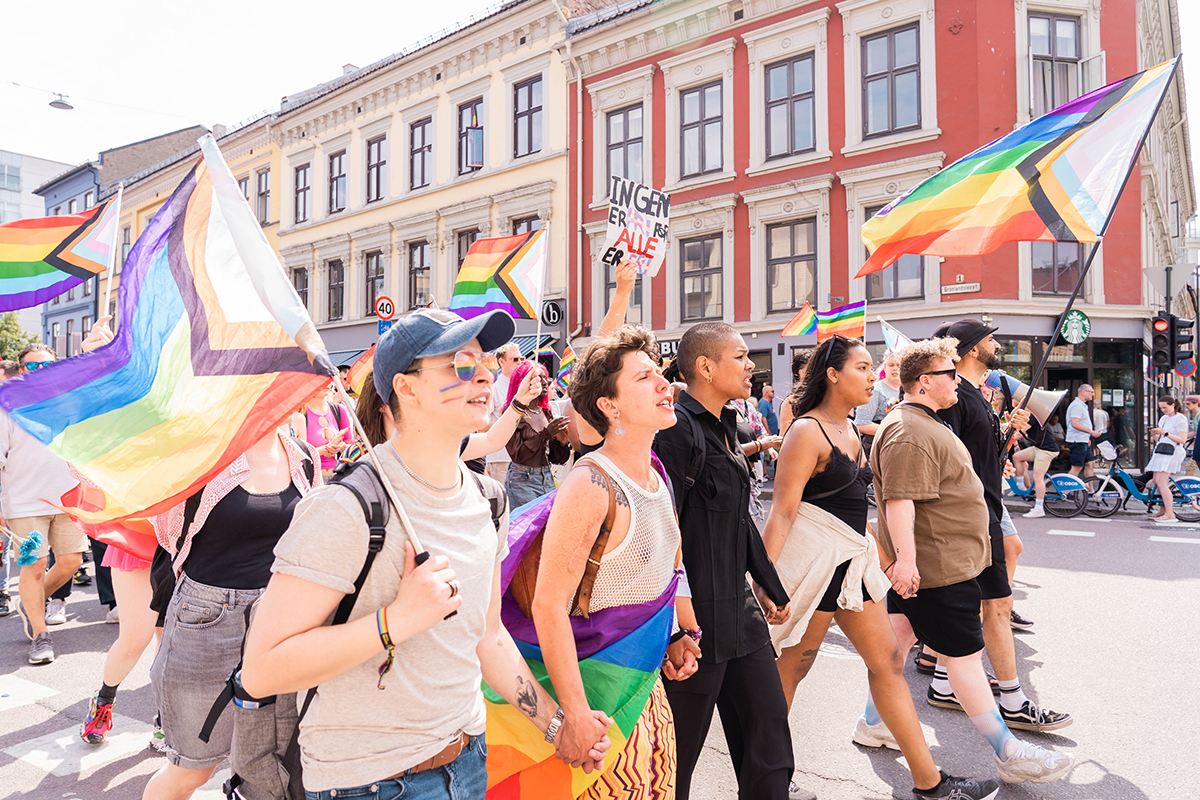
A society where all thrive
According to Iglum, Norway is fortunate to be a small and relatively wealthy country — two factors that have contributed to the development of a very strong social security system. “I think that is actually an important basis for diversity, inclusion and equality, since basic needs are taken care of. We have a health care system paid for through taxes, so you don’t need private insurance. And education is free, even university — you just pay a tiny fee,” she explained. “Basically, if people are hungry, lack proper housing or aren’t receiving adequate education, then it’s hard to focus on some of the other trappings of society, like equality or inclusion.”
A good social system is also of great importance when it comes to closing the gender gap in the workplace. Similar to Japan, previous generations had larger families, and people lived together to help care for the youngest and oldest family members, but times have changed. Norway’s government has prioritized providing quality child care and elder care, which makes it easier for women to work outside the home and enjoy career success.

Along with creating a system where everyone can participate fully in society, Norway also places importance on work-life balance. Iglum points out that it is quite normal for parents to leave work by 4 p.m. to pick up their children. She notes that many parents probably do squeeze in a little bit of work time later at night after the kids have gone to bed, but it is fully accepted that both mothers and fathers will leave the office early in order to prioritize family time in the late afternoon and early evening.
“People sometimes ask, ‘So how do you get the job done?’ I can say that efficiency at work is very high. If you know you have to leave the office by 4 to pick up your children at nursery school, then you will get the job done on time,” Iglum said. “I never felt more efficient than during the years when I had small kids. I was there to get the job done so I could leave on time!”
Norway’s government leads by example. The climate and environment minister, Andreas Bjelland Eriksen, is currently taking 16 weeks of paternity leave, highlighting the country’s commitment to normalizing shared responsibilities. His colleague Tore O. Sandvik has stepped in as the acting minister in the interim.
Norwegian civil servants often leave by 3 p.m. in the summer to make the most of the longer days. “We have very strict rules when it comes to vacation time. It’s every manager’s responsibility to make sure that people take the vacation to which they are entitled,” said Iglum.
In a similar vein, the Norwegian Foreign Ministry encourages employees to think carefully before scheduling meetings. If people choose to set up a meeting, then they should ensure there is a clear purpose and an agenda, to make the most of the time.

Step by step to inclusivity
While Norway is a successful example of an inclusive society, Iglum notes that such progress is by no means quick or easy. “I think it’s important to mention this has actually been due to hard work taking place over many decades, with consistent efforts, step by step. If we talk about gender equality and women’s political participation, for example, it has been a combination of concrete policies from the government at the top and a lot of effort at the grassroots level with local political parties and by women’s organizations,” she explained.
Over the decades, the government has faced criticism for introducing certain policies supporting societal change, and it has taken time to gain understanding from citizens about why these policies are beneficial.
“For instance, the story of women’s political participation in Norway began in the 1960s with initiatives to encourage female candidates in local elections, and at first, nothing happened. Then during the ’70s, we had the women’s movement, there were campaigns on television, and things began to move. Change definitely didn’t come by itself, and if people don’t move and ask for change, then nothing will happen,” Iglum said.
Iglum believes there are parallels with Japan’s current situation. After hitting a record low of 125th out of 146 countries in the gender gap rankings last year, Japan rose to 118th this year, though women’s participation in political and economic sectors still lags well behind that of men. Nonetheless, Iglum says it is encouraging that the government is taking this matter seriously, and she has welcomed the chance to engage in dialogue with various stakeholders in Japan.
One such opportunity came at a recent symposium organized by the Vision Network, which brings together female governors and mayors from around Japan. They were joined by Japanese women in entrepreneurial roles and female ambassadors for discussions centered around strengthening women’s participation in decision-making positions in Japan.
“I think it is very important to have these kinds of opportunities for women to be able to support other women,” Iglum said. “But we also need to discuss these issues with men, too — you can’t have just half of the population making decisions.”

New challenges, perspectives
Issues connected to DEI continue to evolve as fresh challenges present themselves. With the rise of the internet and social media, cyberbullying has become a major problem in modern society. This includes using technology to harass or target someone, or posting personal information, pictures or videos designed to hurt or embarrass someone. Iglum points out that female politicians and those in other positions of power are disproportionately targeted, often becoming the victim of comments about their appearance, for example.
In Japan, online harassment of female local assembly members has also become a serious issue, and younger members who are active on social media are particularly likely to become victims. Problems range from disrespectful attitudes and remarks because of their gender to slurs based on their age, marital status and other private aspects of their life.
The Norwegian government is tackling the issue through education, since children and young people experience cyberhate and hate speech far more often than adults. With the premise that young people have the right to grow up with a safe online environment, the Norwegian Media Authority provides teaching and discussion resources related to cyberhate, online behavior and democracy for pupils in year five of primary school and upward.
Iglum points out that freedom of speech is a basic value well established in Norway, but that the government’s efforts to combat speech that spreads hatred toward other people gets broad support.
And while conversations about DEI tend to focus on how to empower women in society, men are not a monolithic group by any means. There is growing awareness that gender equality challenges affect men, too, including in terms of education and employment, family life, health, civic life and social inclusion.
Established in 2022, the Men’s Equality Commission is a government-appointed commission mandated to examine gender equality challenges faced by boys and men in Norway. Where relevant, the commission will examine the relationship between such challenges and prevailing norms of masculinity.
While Norway’s journey to inclusivity took decades of effort, the nation stands as a reminder that sustained policy change and societal engagement can shift norms. With Japan making strides in this direction, there is room for meaningful cross-cultural exchange and continued growth in gender equity for all.
Read other articles
Download the PDFs of this Diversity, Equity & Inclusion Special
ノルウェーはDEIに関する先進的な政策や取り組みで知られている。ここではクリスティン・イグルム駐日大使に詳しく話を聞いた。
ノルウェーのDEI哲学の中核にあるのはまず、全ての人に平等な機会を与えるということで、外交官も仕事の一貫として多様性を促進することが奨励され、「この職場で働く同僚たちの間で差別が一切ないよう努めることも大使としての私の責任」と話す。
仕事と家庭の両立が男女ともに奨励されるだけでなく当然のこととして根付いているというノルウェーでは、女性の多くが仕事を持つ中で、家族を持ちたいとなればパートナー間で家のことを分担するのは当然のことだ。同国は2024年のグローバルジェンダーギャップリストで2位となり、2017年には世界経済フォーラム(WEF)から「世界で最もインクルーシブなエコノミー」と評価された。
比較的裕福な小国であることが社会保障制度の発展の要因となっているとイグルム大使は話す。「わが国では医療費は税金で賄われ、教育も無償で提供されています。基本的なニーズが満たされることが多様性、平等、インクルージョンといった問題に取り組む上での重要な基盤だと思います」。
社会制度が整っていることはジェンダーギャップを少なくする意味でも重要だ。ノルウェーも日本と同じように大家族で暮らし、家族内で育児や介護を助け合った時代を経て、政府が保育や高齢者介護制度の整備に重点を置き、女性が仕事を継続しやすくしてきた。また、ワークライフバランスを重視し、家族との時間を優先するために多くの親が午後4時に仕事を終え、子供のお迎えに行くことは珍しくない。「そんなことで仕事は終わるのか? と聞かれることがありますが、私自身、子供が小さい時が一番効率的に働いていた気がします」。
このようなインクルーシブな社会は数十年にわたる努力の積み重ねによるものだと、イグルム大使は話す。「女性の政治参加を例に取っても、60年代に地方選に女性候補を出す動きが始まり、70年代になって女性運動が起き、運動が活発化して物事が動き始めました。人々が変化を求めて行動しなければ何も変わりません」。日本の現状には似た流れがあるとし、政府が問題に取り組み始めたことは大きく、各所で対話がなされていることにも期待を寄せる。
DEIに関する問題は進化し続けている。イグルム大使は女性の政治家やリーダーがサイバーいじめのターゲットになりやすい点を指摘する。ノルウェー政府は子供たちが安全なオンライン環境で育つ権利を有するという考えの下、教育を通じてこの問題に取り組んでいる。また、男女平等の課題は男性にも影響を与えることが認識されており、2022年には男性の平等委員会が設立され、男性の性別に関する課題を調査している。
ノルウェーのインクルーシブな社会への道のりは数十年にわたる努力の結果であり、持続的な政策変更と社会的関与が規範を変えることができることを示してる。同じ方向に向かう日本も男女平等の促進に向けた意義ある対話に期待したい。



